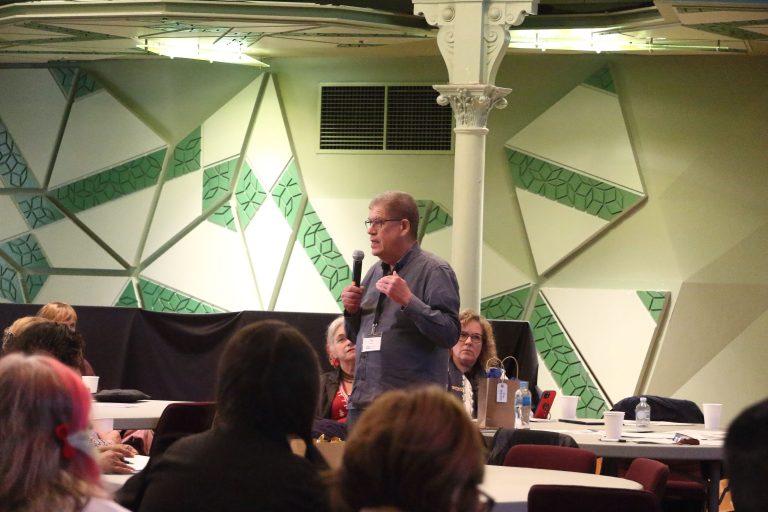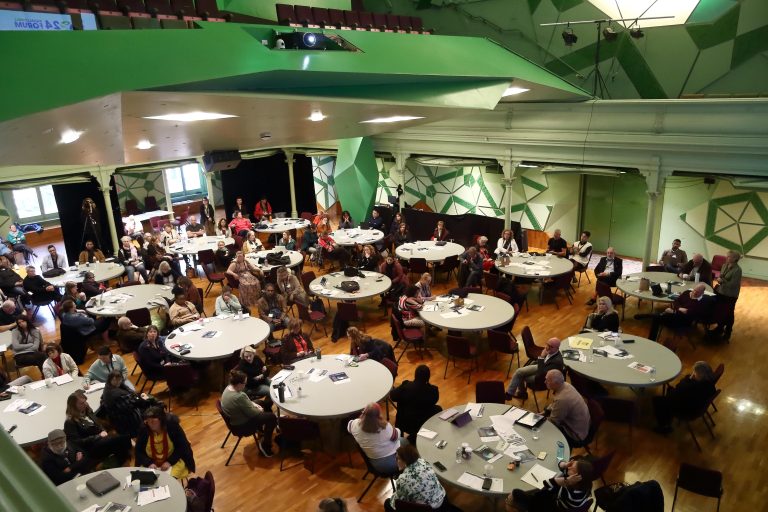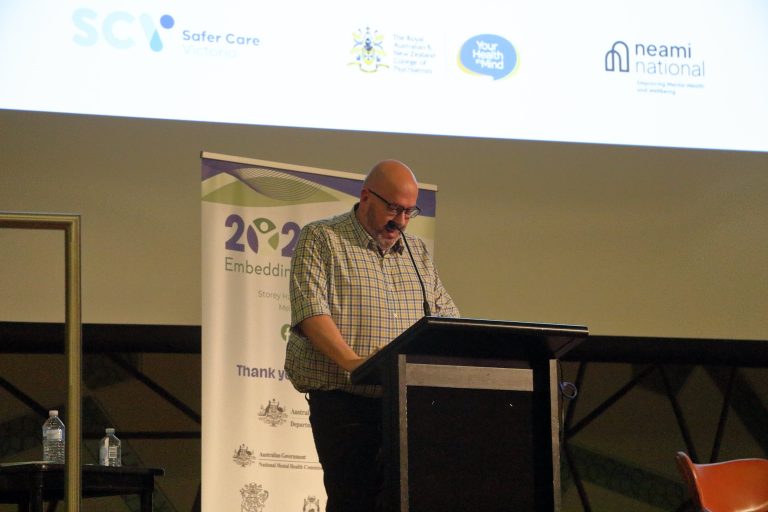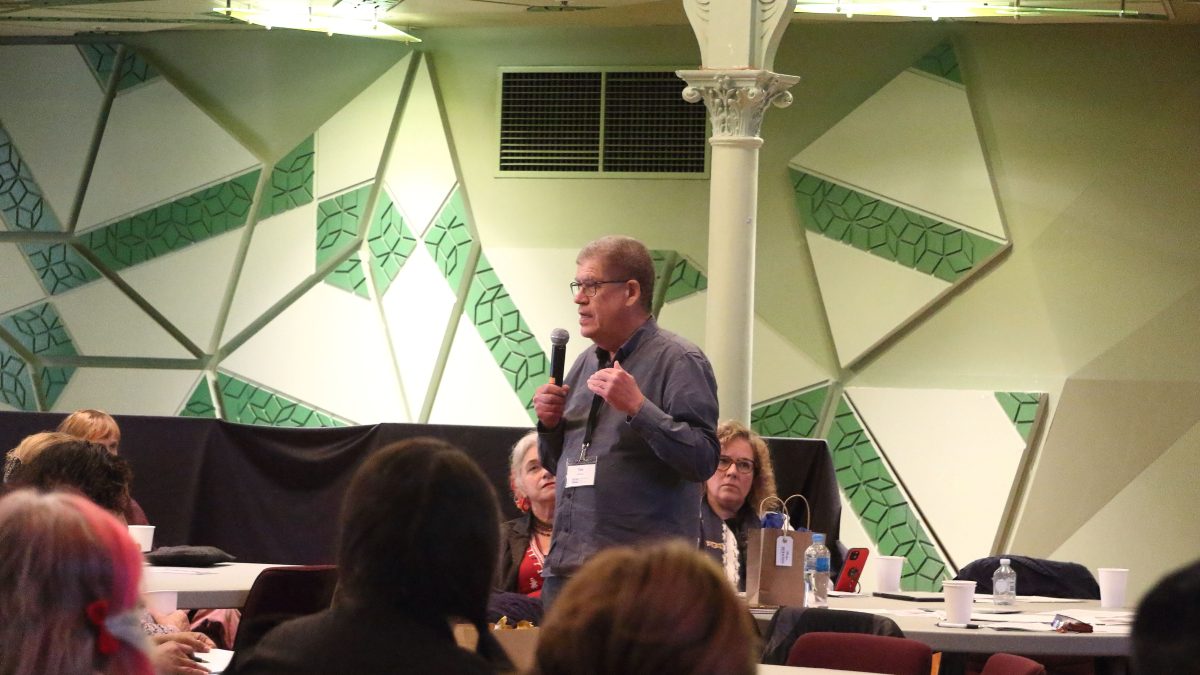Our Equally Well Forum Correspondent Justin Chapman shares his highlights from the 2 days of presentations, launches and workshops at the 2024 Equally Well Forum- Embedding Lived Experience, Storey Hall, RMIT, Melbourne.
You can watch all of the presentations from the two day event on the Equally Well website which will be updated very soon.
Day Two
Opening
Our first speaker was Anna Love, Chief Mental Health Nurse of Safer Care Victoria. With the Royal Commission, there have been changes in structures and establishment of new entities. Equally Well is one of the pieces of work Anna is pushing across Victoria. An example she shared was the Mental Health Improvement Program (MHIP) which is bringing lived experience and the workforce together in a way it hasn’t before. Instead of mental health sitting off to the side in a silo on its own, it’s now seen as a part of health.
Anna emphasised that the lived experience lens is essential in shaping the future of Equally Well. Responsiveness to the communities is needed to provide real time feedback and actions. We need to rebalance power, and leverage the unique skill sets of the lived experience workforce.
“We all have to keep our eyes on what we can do, things we can change, and not accept stigma or lower quality of care – we need to accept that good health outcomes are there for everyone, equally well.”
See Us campaign Equally Well NZ
Simon Kozak, Equally Well New Zealand (NZ) communications lead presented on “stepping out of the echo chamber”. Simon has had an interesting career in communications, and you may remember him from a variety of TV shows and traffic safety advertisements. Simon spoke of the ‘overshadowing challenge’, and recounted his personal experience with hospitalisation after experiencing stroke-like symptoms. He spoke about the Equally Well NZ “See Us” campaign focussing on reducing overshadowing. In partnering with the Pharmacy Guild of NZ they discovered micro-communities – networks of like-minded people who only needed the support of a dedicated leadership voice and group identity to activate together under a common cause.
Workshops
Everyone then split-off into three workshops: (1) inclusive practice facilitated by Clifford Lewis, (2) lived experience leadership facilitated by Daren Wagner, or (3) carers addressing the Equally Well mortality report facilitated by Sharon Lawn. There was a real buzz in the air as the three workshops each generated some lively discussion and active participation from attendees.
Fay Jackson who was recognised at the Forum with an Equally Well Achievement Award for her lifelong commitment to raising awareness about the physical health needs of people living with mental health challenges, spoke in the leadership workshop about being the importance of being the change you want to see and claiming leadership rather than seeing oneself as powerless. When asked what qualities are needed to be a good leader, Fay characteristically said, “Whatever your qualities are, darling”. Taimi Allan followed-up with, “knowing that my experiences enable, not disable”. The key takeaway from this discussion was embracing the power in harnessing your identity and finding your unique contribution. Similar sentiments were expressed in the workshop for Carers led by Sharon Lawn and a rich discussion was held from various carer perspectcives.
Across the workshops, there were common themes of acknowledging the complexity of the space, and persistently creating incremental change through mutual support and upskilling though training, education and mentoring. Key values were in changing the mindset of the system, and to “attack the idea not the person”, and “turn stumbling blocks into stepping stones”.
Afternoon
Facilitated by Professor Amanda Wheeler from Griffith University, the forum discussion was on What is the future for Lived Experience Leadership? We had four discussants dispersed around the room on the floor with the audience: Camilo Guaqueta, Peter Schmiedgen, Tim Heffernan, and Kerry Hawkins.
In this dynamic workshop run from the floor there was plenty of time given to a wide variety of voices. The audience reflected on funding challenges, and that publicly funded programs tend to be short-term and piecemeal, whereas the private sector is financially out of reach for most people. Quality programs are developed and piloted, and even if they evidence real impact and effectiveness, they are often defunded.
Rachel Fishlock, Gayaa Dhuwi (Proud Spirit) Australia
Rachel spoke about The Aboriginal and Torres Strait Islander concept of social and emotional wellbeing (SEWB) encompassing a holistic view of health, including cultural and spiritual wellbeing of the whole community. SEWB includes eight interconnected domains: connection with body, mind and emotions, family and kinship, community, culture, country, spirituality and ancestry. The Fifth National Mental Health and Suicide Prevention Plan (2017) included Indigenous Australians as a priority population for the first time. Implementation of Gayaa Duhwi Declaration was a key action, and the Plan committed services to design, deliver and evaluate services with Indigenous communities and the Aboriginal Community Controlled Health Services (ACCHSs).
Eric Brymer, Southern Cross University— What is green exercise?
Everyone finds different meaning with nature, and the human-nature relationship is highly varied. Nature exposure can be indirect, incidental, or intentional, all of which have some impact on our wellbeing. Allowing us to dream and be a part of the natural world. Research from the UK indicated that when people are asked to take notice of nature every day, people had a significant change in mental health. We need to find ways to connect with the natural world.
The Peoples Panel: The way forward
Chaired by Taimi Allen, we had a panel discussion with Simon Kozak from EW NZ, Jacqueline from the MHWC, Anu Dhingra from SANE, and Russell Roberts from EW Aust. Taimi poised three provocative questions that really got the panel thinking and generated great responses from the audience about how individual and collective accountability is what is needed.
Anu’s response about the future was a good summary of the sentiment of the discussion.
“Honest conversations about mental health and suicide in the open, not behind closed doors. It’s not just a mental health industry problem, it should be part of every organisation’s responsibility. I wish for a world where mental health conversations are held in every setting, not just at the hospital.”
Conclusion
Dave Peters took the stage one last time to wrap up a massive two days. He reflected on connection to country, community, nature and each other. There are many competing forces within services, many of which are calcitrant to change. But Dave reflected that there has been a massive shift in the sector over the last decade:
“It’s people like you who make this change possible. I’ve seen it change dramatically over the last 6 years. I look back to where we’ve come from and find the progress really encouraging and validating”.





